April is National Poetry Month and reason enough to raise a flag to the Word Works, which has been going strong for 42 years.

THE NEWS THAT STAYS NEWS
A special April feature by Grace Cavalieri
THE WORD WORKS has published over 100 titles since 1975, and in addition to "free range" books, it has four imprints: The Washington Prize, the Hilary Tham Capital Collection (open to poets who volunteer to further the cause of literature), the Tenth Gate Prize (for mid-career poets), and International Editions (contemporary translations.) The Word Works is a member of CLMP, launching new titles each year at the AWP Conference.
Here’s a look at new 2017 titles from an EXEMPLAR press.
Okay Cool No Smoking Love Pony by Annik Adey-Babinsky. 77 pages.

This poet is moving — always moving. She’s motion lotion through complex dimensions geographically and psychologically. She seems to say “I don’t know what we are without relationships” and then she positions them in original places with style and high page energy.
I Wanted to Find America
Driving long alone,
this first rest stop after the border
like an epiphany. The woman inside
sells me another phone card.
She is kind and calls me Hon’.
Road signs look more sure of themselves here,
so I load back into the car, feeling very fast.
It’s raining hard in the mountains
and my wiper is broken.
My car keeps shaking on the downhills.
Think of dying in a different country.
Pray to god, the one on the money.
It’s overcast and I’m driving by a river
where men are fishing
up to their knees in freedom.
I want to try that fish. I want
to buy a root beer and an Archie Comic.
I want to own a keychain covered in stars.
Haji As Puppet: An Orientalist Burlesque by Roger Sedarat. 87 pages.
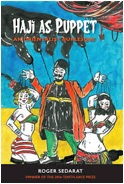
There are many ways to tell the truth and Sedarat does it differently on each page with high jinx. Theater is the matrix and all the world’s Haji’s stage — shenanigans attack every known institution including poetry, complete with puppets, anthropocentric and sassy.
Po Biz
You gotta get a gimmick!
— Bette Midler,
With doe-eyed
Natalie Wood
seductive gazes
at an audience hungry
for ethnic reduction
Haji summons a syringe
from offstage,
rolls up a sleeve
of his silk shirt
to draw first blood
from olive skin
ripe for the pricking.
Armed with fresh ink,
he paints humdrum
hegemonic towns
red with the shame
of his difference,
signing his name
like the last line
of a ghazal couplet,
conceptual Shia’ martyr
figuratively dying
for his art.
Stain by Nathalie Anderson. 90 pages.
In Anderson’s long poems I feel Dylan Thomas’ breath on her back. Her Tableaux are multiple sounds and images, coalesced, turned back on themselves in vowel and consonants. This woman is a beautiful beacon of optics and sonics.
The Moon Path
After a painting by Elliott Daingerfield,
Columbia Museum of Art, Columbia, S.C.
It was on the moon path where I last denied him,
where moonlight gloved the hand he raised in parting, slicked
the side of his face, brightened his white hair. I see now,
he said: I’m no one’s dream or future. It was
just days since he died, but still it took me long enough
to work through the pun of it, his double-edged and
two-faced implication, while he paused a moment
in the ivory doorway, letting it all go. I wonder
how I looked to him then, my throat tight and my hands
clenching, the veil of moonlight cast over my face,
my flesh pearling with it, shawled with it, light whirling
me round like a garment in wind, rippling the leaves
into waves so I walked like the moon on that water –
how any girl looks to the eyes he sees with now.
In my dreams, even still, he’s always propositioning.
In his, it was always proposing.
Hunt by Jessica Cuello. 75 pages.
This is a study of inhumanity framed by “Moby Dick.” The story within the story is best told by Ahab's wife who fears his return; this is a broader tale than mere ‘hunt and capture’ utilizing a classic story; these poems are all coinage of oppression, not the least is that of man to woman. But transformation into art wins the day.
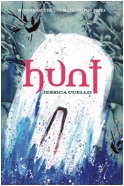
Chowder
Chapter 15
Leave the iron down with me.
Housekeeping and sexless,
I find the unmade bed, the tooth left.
I do not stop to feel. I feed the men.
Chop clams. Think I don’t know
I’m the laugh and lackey?
Think I don’t —
I carry bowls, I nag, begin. Alone
I undress my body — this dark home —
heavy, fish-smelling.
I set my necklace of polished
fish vertebrae on the dresser
and remember Mother’s dry
arthritic hands that served
when they couldn’t bend.
Leave the iron down with me.
I’m stopping death.
I found a body pierced
with a harpoon — an accident.
I’m making soup.
Thankless stirring,
the leftover of woman.
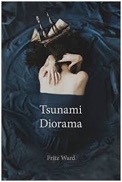
Tsunami Diorama by Fritz Ward. 74 pages.
At the heart of this foot-tapping fun-tipping language is a lot of light and mercy. There’s sweetness even as Ward uses his fine-honed humor to make sense. His craft looks as if he’s invented it, all new and clean. I’m absorbed by this poet’s mind, seeing everything from within with his storied skillset.
Love Letter Rattling the Bell Jar
Dear Less-Than-Judy-Garland, love is merely a suggestion: an Oz-factory of rube-red sequins manufactured from parts of the witch’s heart. Let me propose an alternative plot: a night-edged merlot, a riding crop with a clause, a mildly historical curse. Better yet, you arsoned your way across the room, past the pine needles and the holly. I widened my loneliness to include you. So very so. We gooseberried, then re-married. All afternoon, we lay in bed listening to the early recordings of rain. We floated, but still found ourselves submerged. When the listening ceased, you made a bridge of my fingers. I tore your name in half and let the river decide which vowels to drown. Oh fuck the why, the what and the how — Darling, this time I choose your meatloaf all over again. I choose your naked feet upon my bare chest.
Letter That Never by Ann Pelletier. 62 pages.
Using every kind of form, Pelletier chronicles the very act of being alive. In this book length poem, the poet manages to unify and unite disparate fragments of existence. There are family references, fathers, houses; yet these are voices for portals to a lighter world capturing spirit in form — saying not all questions deserve answers. We have many identities and all of them reach to stay, but must go.
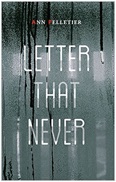
(untitled)
before my blouses had been unbuttoned
before I bore this distinctive name
before the establishment of this new style
before crossing the fraying bridge (or shortly thereafter)
before restrictions and closures
before being chased by the bird faking wing break
how was I to proceed?
before natural forces
before allowing anyone to
before shaking these silver dollar petals
I would sit in my sunny doorway
marvelously lucky and naive
Hen & God by Amber West. 87 pages.
West is a kick- ass poet with a big heart. She has a tone you can’t teach, combining a sharp spark and a good mind. This is out of the ordinary writing and a secret code for success. There’s unlimited space beneath her lines because she’s re-creating the poem in layers. Peel it back the poem’s still game. There’s more meaning waiting.
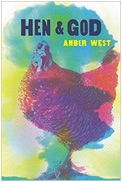
Poem as God
I am god and my cock
crows lightning
My nipples are thornless
roses, my armpits
a licorice forest
176 toes
my feet are pianos
every step I take is a song
I am god, I decided
women who starve themselves
will grow long soft fur
on their forearms
Men who sleep
with scores of girls
may enjoy their lives
but not their deaths
I piss liquid gold — hell, I shit
bricks of it — sure, I am god
but some afternoons
I lay in my hammock
turn off the magic, try to play
a fair game of cards, see if
I can survive by my wits —
good looks don’t hurt
neither does a can
of pepper spray
I am god and my ears
are the wings of the world
Seed by David Eye. 73 pages.
“Someone always leaves” the Speaker says, as loss is magnetized and stunned by verse. The Voice lives in a world of longing, an array of loves, something always out of reach. There are parents, a grandmother, people, predicaments. The broader view is that intimacy is a precious stranger that invigorates as it vanishes. Seed is about mortality, while “Love” is immortality.
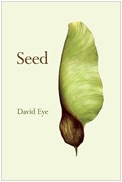
You Said Listen
It was one of those songs —
shut us up at the turnoff,
kept us in the truck
that night, our dashboard
eyes on the radio dial —
Could you see it like me ....
Now I see you hated it
here in the hills
unnerved by the night
but you never let on
and that — finally —
is a kind of love.
Grace Notes by Jean Cocteau (translated from French, Appogiatures)
by Mary Sherman Willis. 119 pages.
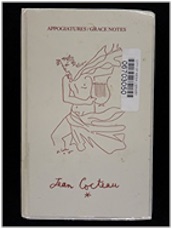
This is part of THE WORD WORKS international series edited by Barbara Goldberg. We may ask what Cocteau is doing in a contemporary poet’s press but this is easily answered as a substantial DC poet is Cocteau’s translator. Cocteau certainly transcends centuries and I’d forgotten he lived till 1963 — seems from another time, maybe another planet. Mary Sherman Willis is the one who’s providing gracefulness to the “Note,” in service of poems with body parts contorted and human behavior so unconnected from human motivation. Cocteau is fascinating and finally accessibly enjoyable here. Cocteau, here, with linear thought:
Poetry Sports Report
A word just took the lead. A verb follows close behind and forces the placement of the period. But no! But no! One simple letter rushes to beat the capital. The period gets away. In a magnificent breakaway, a comma catches up. The opening in the center doesn’t budge. The lead word sees it right away, not where it was supposed to be. It propels the syllables in a turning maneuver that becomes an offensive no one could have expected, and which tips the enjambment off balance. It drops, dragging the whole stanza with it. It’s a real fight when the deleted word dashes off and induces the others to scramble before the lead word notices. The deleted word passes to the left and the referee announces a free kick for the rhyme, which seems to weaken. It recoups. Unfortunately it passes too high. Resumption of play drags off the adjectives, which have been waiting for a chance to play a role in the match.
The Madness of Chefs by Elaine Magarrell. 142 pages.
If ever a press exists it’s to memorialize voices like this. Magarrell led the way with courage and truth, thanks to her time-honored narrative form. The entanglements of marriage and ageing are strong forces here. She says everything we didn’t dare, with dignity and flare, as if she’s next to us whispering secrets; she’s funny, too, because humor is just failed tragedy. When she tries to dye her hair blonde and it turns orange, she’s always saying something a lot more, with herself as the brunt of the joke. But we’re not laughing as much without her. Two poems here:
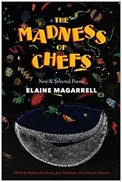
The Joy of Cooking
She has prepared her sister’s tongue,
scrubbed and skinned it,
trimmed the roots, small bones and gristle.
Carved through the hump it slices thin and neat.
Best with horseradish
and economical — it probably will grow back.
Next time perhaps a creole sauce
or mold of aspic?
She will have her brother’s heart,
which is firm and rather dry,
slow-cooked. It resembles muscle
more than organ meat
and needs an apple-onion stuffing
to make it interesting at all.
Although beef heart serves six
her brother’s heart barely feeds two.
She could also have it braised
and served in sour sauce.
A Surfeit of Desire
Your unerring sense of direction
has always hurried us through
what Merwin calls the anniversaries
of our deaths. You take
the linear route and I follow
describing my loop-de-loops.
Now with bodies shrunk from age
our appetites effervesce
with too much desire; we feel
we must travel farther, exercise
harder, love, love. Wait,
I’m coming. Soon enough we’ll remain
in stasis. For the rest of our days
let’s take all the time
in the world.
Like stars
throwing off matter and fated
to collapse, our last destination
is inward. That being a bearing
I know how to take, dear heart,
you must let me go first.
Grace Cavalieri’s latest book of poems is With (Somondoco Press 2016). Her monthly column on poetry in the Washington Independent Review of Books is “EXEMPLARS.”
Review copies should be sent to:
Washington Independent Review of Books
7029 Ridge Road
Frederick, MD 21702
THE WORD WORKS is a nonprofit literary and educational organization dedicated to the support and perpetuation of contemporary poetry and literature for the cultural enrichment of humankind. It is a volunteer organization operating without discrimination regarding gender, race, color, religion, age, national origin, disability, sexual orientation, or any classification protected by State or Federal discrimination laws. The Word Works carries out its mission through book and World Wide Web publication, competitions, special projects, and public programs. Developing audience for poetry is a critical goal in its effort to promote and support outstanding literary work.

